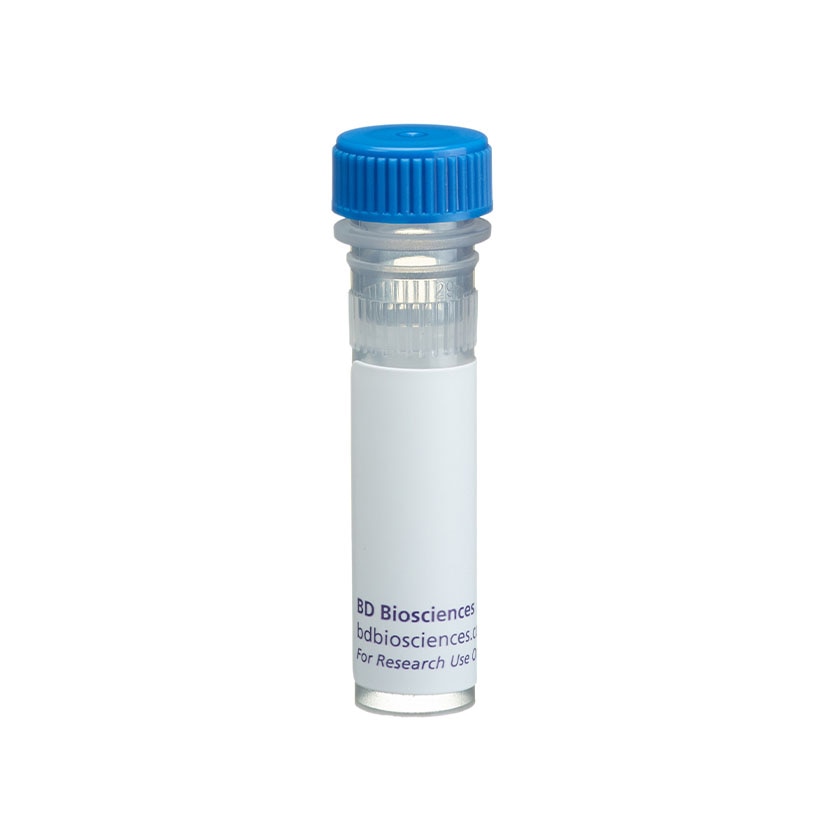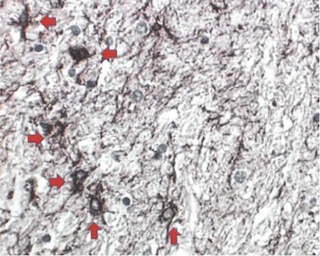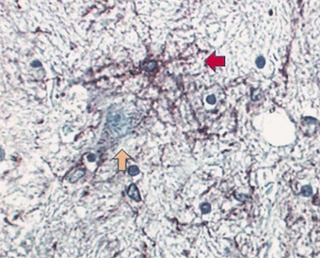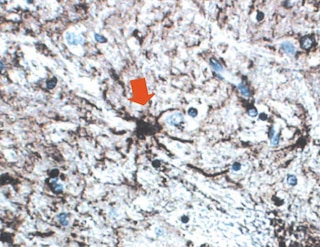-
Your selected country is
Middle East / Africa
- Change country/language
Old Browser
This page has been recently translated and is available in French now.
Looks like you're visiting us from {countryName}.
Would you like to stay on the current country site or be switched to your country?






Immunohistochemistry analysis of GFAP expression on human brain. Formalin-fixed, paraffin embedded section of human brain was stained with Purified Mouse Anti-GFAP (Cat. No. 556329) and visualized using a DAB chromogen and hematoxylin counterstain. Red arrow indicates an astrocyte (positive).

Flow cytometric analysis of GFAP expression on human brain cell line U373. U373 cells were stained with either Purified Mouse Anti-GFAP (solid line histogram) or Purified Mouse IgG2b, κ Isotype Control (dashed line histogram; Cat. No. 556654), followed by PE Goat Anti-Mouse Ig (Multiple Adsorption) (Cat. No. 550589). Fluorescent histograms were derived from gated events with the side and forward light-scattering characteristics of viable cells.


BD Pharmingen™ Purified Mouse Anti-GFAP

BD Pharmingen™ Purified Mouse Anti-GFAP

Regulatory Status Legend
Any use of products other than the permitted use without the express written authorization of Becton, Dickinson and Company is strictly prohibited.
Preparation And Storage
Recommended Assay Procedures
Pharmingen offers additional GFAP specific antibodies: clone 1B4 (Cat. No. 556328); 4A11 (Cat. No. 556327); clones 1B4, 4A11, 2E1 combined and available as a "cocktail" (Cat. No. 556330). Applications include immunohistochemical staining of formalin-fixed paraffin-embedded brain tissue sections (5-25 µg/ml); and western blot analysis (1-2 µg/ml). Rat brain is suggested as a positive control.
Product Notices
- Since applications vary, each investigator should titrate the reagent to obtain optimal results.
- An isotype control should be used at the same concentration as the antibody of interest.
- Caution: Sodium azide yields highly toxic hydrazoic acid under acidic conditions. Dilute azide compounds in running water before discarding to avoid accumulation of potentially explosive deposits in plumbing.
- Sodium azide is a reversible inhibitor of oxidative metabolism; therefore, antibody preparations containing this preservative agent must not be used in cell cultures nor injected into animals. Sodium azide may be removed by washing stained cells or plate-bound antibody or dialyzing soluble antibody in sodium azide-free buffer. Since endotoxin may also affect the results of functional studies, we recommend the NA/LE (No Azide/Low Endotoxin) antibody format, if available, for in vitro and in vivo use.
- Please refer to http://regdocs.bd.com to access safety data sheets (SDS).
- Species cross-reactivity detected in product development may not have been confirmed on every format and/or application.
- Please refer to www.bdbiosciences.com/us/s/resources for technical protocols.
Companion Products



GFAP (Glial Fibrillary Acid Protein) is the major protein of glial filaments in differentiated astrocytes. BD PharMingen offers a panel of monoclonal antibodies (4A11, 1B4, 2E1) that specifically recognize GFAP. They do not cross-react with other intermediate filaments such as vimentin, neurofilament proteins, desmin, keratin, neurotubules or microfilaments. Bovine spinal cord homogenate was used as immunogen for clone 2E1. This antibody has broad species reactivity. It recognizes GFAP in brain homogenates from human, mouse, rat, cow, sheep, dog, pig, rabbit, guinea pig and chicken. 2E1 is particularly useful for identifying GFAP in immunohistochemistry of frozen and formalin-fixed, paraffin-embedded brain tissue sections. Additional applications include western blot analysis and indirect immunofluorescence of tissue-cultured cells.
Development References (3)
-
McLendon RE, Bigner DD. Immunohistochemistry of the glial fibrillary acidic protein: basic and applied considerations. Brain Pathol. 1994; 4(3):221-228. (Clone-specific). View Reference
-
McLendon RE, Burger PC, Pegram CN, Eng LF, Bigner DD. The immunohistochemical application of three anti-GFAP monoclonal antibodies to formalin-fixed, paraffin-embedded, normal and neoplastic brain tissues. J Neuropathol Exp Neurol. 1986; 45(6):692-703. (Clone-specific: Immunohistochemistry, Western blot). View Reference
-
Pegram CN, Eng LF, Wikstrand CJ, McComb RD, Lee YL, Bigner DD. Monoclonal antibodies reactive with epitopes restricted to glial fibrillary acidic proteins of several species. Neurochem Pathol. 1985; 3(2):119-138. (Clone-specific: Immunohistochemistry). View Reference
Please refer to Support Documents for Quality Certificates
Global - Refer to manufacturer's instructions for use and related User Manuals and Technical data sheets before using this products as described
Comparisons, where applicable, are made against older BD Technology, manual methods or are general performance claims. Comparisons are not made against non-BD technologies, unless otherwise noted.
For Research Use Only. Not for use in diagnostic or therapeutic procedures.
Report a Site Issue
This form is intended to help us improve our website experience. For other support, please visit our Contact Us page.